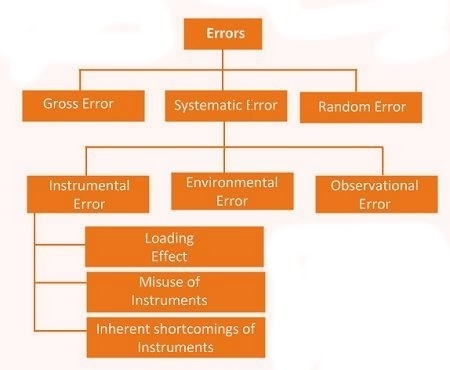Gross Errors: Definition, Types and Examples
By BYJU'S Exam Prep
Updated on: September 25th, 2023

Gross Errors are termed blunders or mistakes in measurement. In the surveying works, different types of measurements need to be taken. These measurements may contain several errors caused by various sources. The source of errors can be the human source or errors in instruments. Gross errors can also be termed as all the errors that occur in a particular measurement of the surveying.
Gross Errors PDF
A measurement in surveying should be free from gross errors before its use for calculation purposes. Gross errors or blunders or very unpredictable in the measurement. It can cause due to human mistakes, and it must be avoided for the correct measurement. This article contains all the information related to gross errors in surveying.
Download Formulas for GATE Civil Engineering – Irrigation & Hydrology
Table of content
What are Gross Errors?
Gross errors or blunders are errors in the measurement that arise due to the surveyor’s carelessness and can not be corrected. The Law of probability also can not be applied to gross errors. These are unpredictable and can’t be estimated. Due to gross errors, a large impact on the measurement can be seen, so it should be avoided in the measurement.
Gross error can also occur if the surveyor works over a long time, and due to tiredness, improper measurement can occur. It can also occur due to mistakes in the setting of the instruments. Correct reading taken by the improperly adjusted instrument leads to incorrect reading and the generation of gross errors.
Formulas for GATE Civil Engineering – Fluid Mechanics
Gross Error Definition
Gross errors can be defined as the blunders or mistakes occurred by the human being during the measurement. As per the GATE exam, Gross errors are generally not categorized in terms of the types of errors because no theory of errors applies to gross errors. The measurement can observe gross errors even by taking high-precision instruments.
Measurement consisting of the blunders must be revised before the calculation work using that observation. These errors can only be checked during the overall check of the survey data. But small errors still remain undetected.
Formulas for GATE Civil Engineering – Environmental Engineering
Gross Errors in Measurement
Gross measurement errors are the blunders that can occur due to the mistake taken by the surveyor during the measurement. Gross measurement errors can occur due to the carelessness of the surveyor or due to the improper adjustment of the instrument while taking the observations. Here, different measurement errors as per the GATE CE syllabus are explained below.

Types of Gross Errors
As mentioned in the theory of errors, Gross errors are blunders that can cause by various reasons during the measurement of the survey work. An incorrect measurement taken by surveyors mainly causes gross errors. Based on the generation of the blunders, the gross error can be classified into the following types.
- It can occur due to misreading the measurement.
- This may be due to incorrect adjustments to the instruments
- It can occur due to improper application of the instruments
- It can occur due to computational mistakes during the calculation of survey data
Example of Gross Errors
As we know, gross errors are the blunders caused by improper measurement or surveyors’ mistakes. A gross error check can be done during the computational of the surveying data. For example, if the surveying data of 114.30 is written as 140.30 by mistake, it will be considered a blunder. Here a few examples of blunder mistakes are given below.
- Improperly leveling the surveying instrument.
- Setting up the instrument or target over the wrong control point.
- Incorrectly entering a control point number in the data collector.
- Transposing numbers or misplacing the decimal point.



